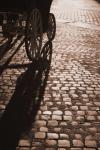Suffolk smugglers

Even before she arrives at White Ladies, Mary Finch is warned about smugglers or ‘free-traders’. Smuggling was common in Suffolk and across Britain during the eighteenth century, with tea, tobacco, silk, wine, and spirits being popular cargoes.
Smuggled goods would be brought ashore at secluded locations, cached, and then transported inland, typically to London. In some areas, obtaining and transporting the goods were separate operations, but some large, well-organised gangs managed the entire affair, relying upon fear or complicity among local residents to avoid detection, and employing violence against any who opposed them.
The ‘golden era’ of British smuggling came to an end in the 1780s, when the government cut the duties on tea and French wines, introduced a comprehensive warehousing scheme for tobacco, and passed legislation authorising the seizure of vessels ‘hovering’ within three miles of the English coasts and found to be carrying wine, tea, or coffee. These measures, along with the increased activity of the customs service and the willingness of juries to impose harsh penalties on convicted smugglers, severely stemmed, but did not cut off, the flow of illicit goods.
The trade continued in remote areas, and when war with France began in 1793, enterprising men on both sides of the Channel recognised the commercial opportunities that hostilities between their two countries presented.
